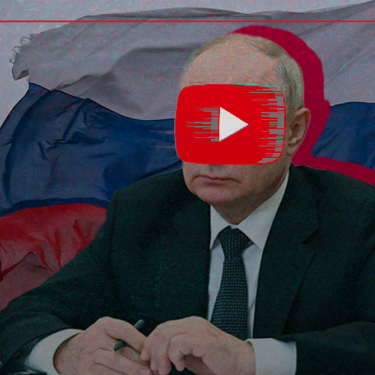Russia slows YouTube’s playback speed, jeopardising right to information

The Russian authorities have stepped up their control over YouTube content by drastically slowing its video playback speed to the point that videos can no longer be viewed. Users have also reported limited access to the platform. Reporters Without Borders (RSF) condemns the Kremlin’s use of this latest censorship method, which jeopardises the right to information.
Viewing YouTube videos became impossible on 8 August in the Russian-occupied Ukrainian regions of Donetsk, Luhansk and Crimea because the playback speed had been reduced so much. At the same time, YouTube users in the Russian cities of Moscow and Saint-Petersburg reported that they were no longer able to access the platform.
The gradual blocking of YouTube began in Russia, where the authorities decided to reduce the speed of YouTube video playback to 128 kilobits per second, well below the speed needed for optimal viewing.
The slowdown, which was officially announced by Russia’s telecom operators, is being carried out through “technical devices to combat threats” (TSPU) – “black boxes” progressively installed at the country’s telecom operators since 2020 by Roskomnadzor, the Russian telecom regulator. The “TSPU system” not only slows down traffic, but also blocks sites deemed undesirable, intercepts data from unencrypted sites and blocks VPN connection protocols. Russian operators are forbidden to remove these boxes or risk losing their licence.
“The Kremlin is well on its way to achieving its disgraceful project of locking Russian citizens into an information prison where only propaganda is able to circulate freely. Despite its flaws, YouTube has continued to be one of the few remaining tools that independent Russian journalists in exile could use to disseminate reliable content to their fellow citizens. RSF condemns this censorship tactic and urges the authorities to restore normal video playback speed on the platform.
YouTube in Kremlin’s sights
Russia has been targeting the US video platform for months. In April, Roskomnadzor accused YouTube of being “one of the main platforms for spreading disinformation” about Russia’s invasion of Ukraine. In early July, Rostelecom, one of Russia’s largest telecom companies, whose main shareholder is the Russian state, tried to justify future slowdowns on YouTube by pointing to the “outdated” equipment used by Google, YouTube’s owner. When the first slowdowns were reported by users on 1 August, Google immediately denied causing them.
Russian authorities had warned that they would take direct action against the platform. Alexander Khinshtein, the chair of the Russian parliamentary committee on information policy, announced on 25 July that YouTube video playback speeds would be reduced by 70% in early August. This measure, supposedly taken to combat “the administration of a foreign resource that violates and ignores Russian legislation,” is in reality a direct response to YouTube’s removal of Kremlin propaganda content since Russia’s invasion of Ukraine in February 2022.
The Russian news site Gazeta.ru quoted a source close to the Russian president’s office as saying that the platform could be entirely blocked by the autumn after a gradual decline in service during the summer.
Censorship of independent media
Independent Russian media and journalists who have been forced to flee the country since Russia’s invasion of Ukraine have developed video formats on YouTube to circumvent the censorship imposed by the Kremlin, which is tightening its grip on the Internet.
In a sign of YouTube’s success, videos by independent journalists and media accumulated 165 million views on the platform in September 2023, according to data in a report published by The Fix and the JX Fund, which RSF created to support journalism in exile. YouTube’s success can be explained in part by the fact that, unlike Facebook and Instagram, YouTube had not yet been banned by the Russian authorities.
A demonstration planned by YouTube users in Moscow on 17 August in protest against the playback slowdown has been banned by the authorities.
Russia is ranked 162nd out of 180 countries in RSF's 2024 World Press Freedom Index.
